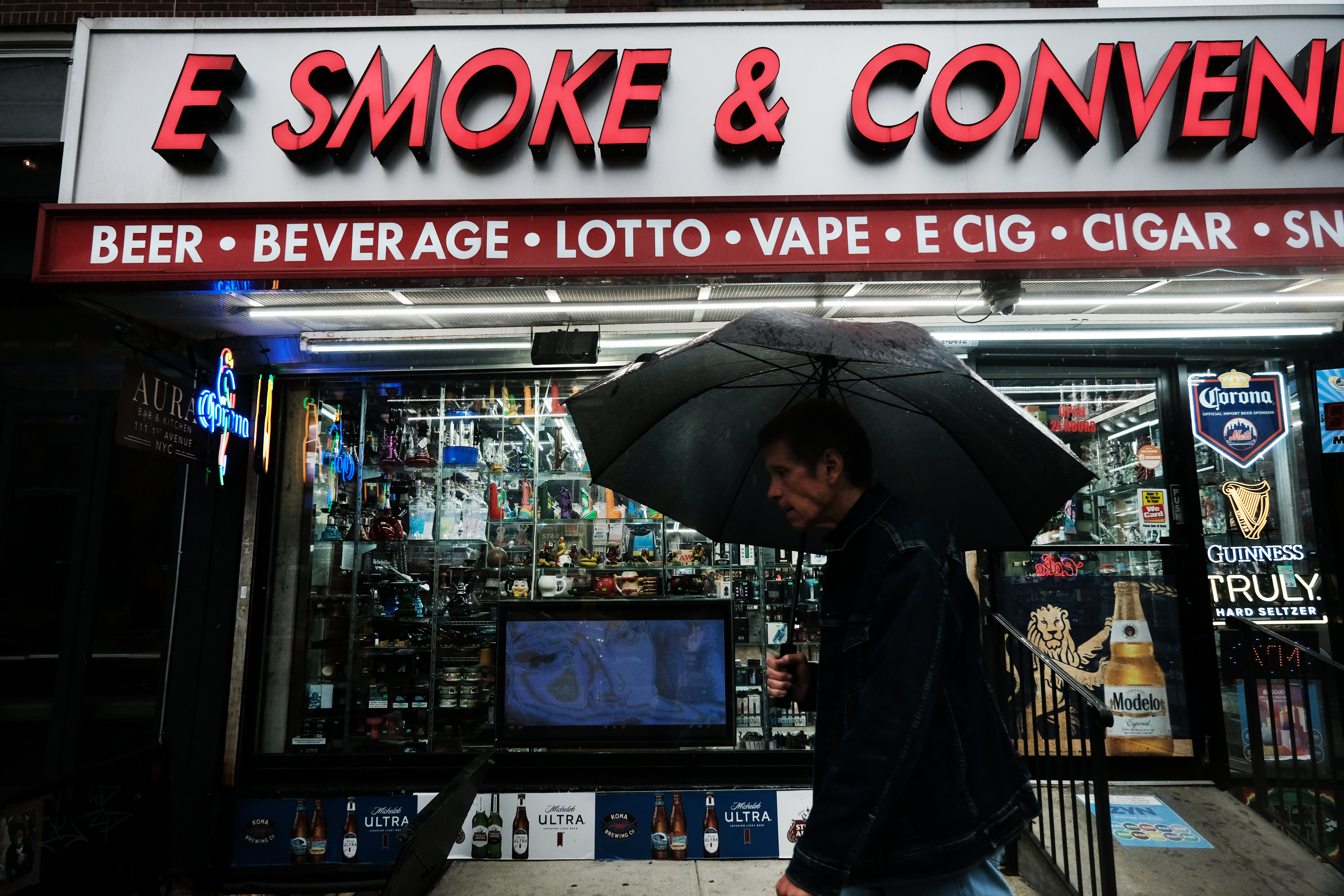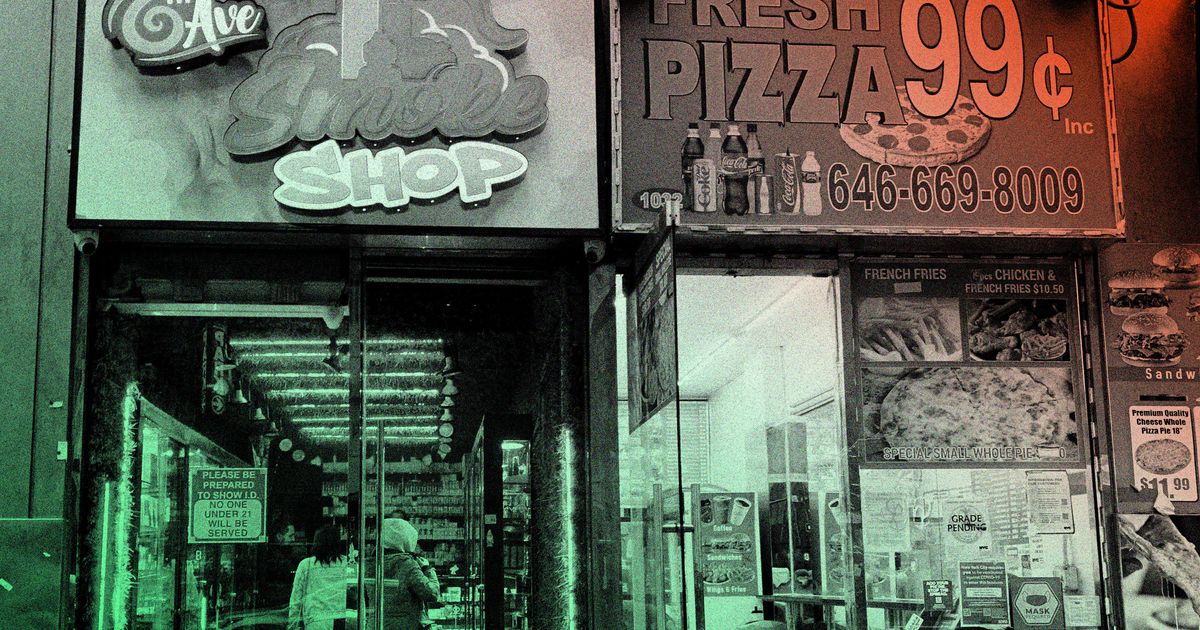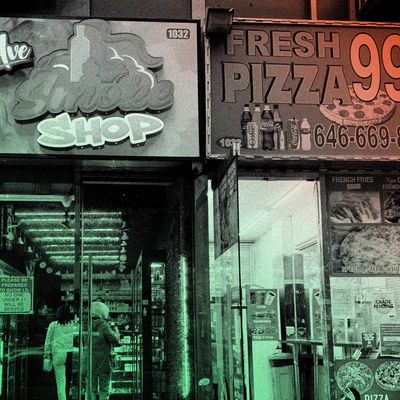Chris Alexander, executive director of the New York State Office of Cannabis Management, is frustrated by their staying power.

nymag.com
Subscribe
just asking questions Feb. 20, 2024
Why Are There Still Illegal Weed Stores All Over the City?

By
Benjamin Hart, staff editor at Intelligencer who joined New York in 2017
Photo-Illustration: Intelligencer; Photo: Lindsey Nicholson/UCG/Universal Images Group
Soon after New York legalized marijuana in 2021 — and well before any legally licensed cannabis dispensaries opened — a new kind of shop began popping up around town, colonizing many storefronts left empty by the pandemic. In 2022, Curbed dubbed these stores “
weed bodegas,” describing the fly-by-night businesses as “part smoke shop, part convenience store, part dispensary, all packaged in the aesthetic of a Monster Energy drink.”
Beyond their illegality, garishness, and questionable product, weed bodegas have undermined cannabis entrepreneurs who follow the rules, many of whom navigated tangles of red tape and extended delays to open legal dispensaries — or are still doing so. The bureaucratic chaos has put a blemish on New York’s pioneering attempt at prioritizing racial and gender diversity, as well as those
previously convicted of marijuana-related offenses, in its licensing program. Almost since the weed bodegas’ inception, the city and the New York Office of Cannabis Management (OCM), which regulates marijuana sales, have been talking about
cracking down on them — yet they’re as
thick on the ground as ever. Lawmakers are now speaking with more urgency: Governor Kathy Hochul
recently called the state’s cannabis rollout a “disaster” and has proposed legislation that would grant OCM more power to shut down illegal businesses. I spoke with Chris Alexander, executive director of the agency, about the difficulty of closing illegal shops, why he’s glad police aren’t more involved in enforcement, and what’s around the corner for legal weed in New York.
Why are there so many of these shops still around after three years?
That’s a good question. Since the proliferation began, we decided to take it on. This was not the initial design of the office, the initial function of the office. We knew that there would be some increase in legal activity or illicit sales, which was happening in every other market. But because this is New York, it’s more.
At the beginning of this, I would attribute the delayed response to the folks who would normally engage in this type of enforcement, and to education. We had to remind law enforcement, for example, that yes, we legalized, but the condition of being a legal business is that you’re licensed, just like the New York State Liquor Authority. So if you are engaged in activity without a license, the same penal-law offenses apply. Those offenses are still on the books. But I think there was also a greater shift of expectation from the wider communities, local leaders, etc., that the entity that would be regulating the plant would also step in, in a way that SLA doesn’t for illegal cannabis shops. So we stepped in. Like any law where the enforcement mechanism shifts from criminal to civil, there are challenges. It is still a criminal activity, but we are taking enforcement action. And in doing that, first we had to pass the law to give ourselves the authority to take that action because the original law did not give us authority over unlicensed shops, despite anybody’s imagination. Then we had to pass regulations, create a hearing process, create controls around the plant that’s being seized, develop penalties, and hire people to do this new thing we’re doing. It’s a frustration point, as you can probably hear in my tone a little bit.
Yeah. And you can hear from my question that I am somewhat confused — and I think this is widespread — about who is enforcing the rules here, and who has the power to enforce them.
Well, I’ll say — we’re doing it. A lot of the smoke shops are presenting themselves as smoke shops, and the city sheriff has control or authority over those selling tobacco products, so they’ve been engaged in the process. The district attorneys have not been prosecuting cannabis offenses generally, but they have been helping to facilitate landlords kicking people out for engaging in this activity. The Department of Tax and Finance has had a role with us doing investigations. Everybody’s doing a little bit of something, but largely OCM has taken this on.
It seems like this might be a classic New York City problem of agency coordination, where there’s five different entities that have a role in maintaining something, and together they’re less effective than one entity would have been with all those powers combined.
I wouldn’t say that exactly, because there’s been coordination. I think the problem at the start was — who owns it? Because, just to be very frank, in the back of my mind, I was asking why law enforcement wasn’t doing what they had done for the last 40 years,
to an excessive level in certain communities.
A fair question.
I spent a long amount of time just basically saying, “We left penal-law offenses on the books. Why are people not getting arrested for these offenses?” But once we get over that and just accept that this is a shift from a criminal to a civil enforcement action, now it’s just on us. I wouldn’t say it’s a lack of coordination. It’s just the fact that we have to now build out the rules of that civil engagement because they didn’t exist before. In the beginning, I would often say, “Well, they’re not just breaking the cannabis law by selling without a license, they’re also breaking municipal laws. They’re also breaking the penal laws, and tax law.”
Why do you think police would be so hesitant about taking action? It seems unlike them, as you said.
I would say that this was a big shift. When we legalized, people had to adjust to what that meant, because you know that now you’re not going after the low-level person smoking a joint. The role changes. I think it’s just been education and adjustment in that way.
And I will say, the NYPD and local law-enforcement agencies across the state have helped with sites, maintaining site control and safety, so I do appreciate that support. But yeah, it’s a reeducation. I think because we weren’t first, people don’t recognize how much has happened. We’ve shifted significantly since legalization in terms of a lot of our public policy, and so it just takes time for people to adjust.
I don’t think people should be prosecuted and sent to prison or anything, but it does feel like if, say, I tried to sell liquor out of my house, I would be shut down within about an hour. Whereas these shops can just break about five different laws, as you just said, and the attitude is, “Well, we’ll wait a year or two and see what happens.” It’s just very puzzling, as an outside observer.
I agree a hundred percent. And that frustration is — shit, I’m a New Yorker. I get calls from parents and school officials and educators who are like, “Well, why did we legalize if they’re going to sell it to kids?” That was part of the narrative, that we would restrict access for kids. And that’s why there’s still a felony offense for selling to a minor.
We’ve been very effective at seizing people’s weed. That’s not been a problem. We are taking people’s weed every day. The issue has been the closure of these shops. That’s what’s been creating an obstacle to really seeing the realization of the commitment of resources. We’re just not closing the shops in an expedited way.
And why do you think that is? What is preventing your office from doing this more expeditiously?
As we created the civil enforcement regime, we did create quite a few barriers for ourselves. I say for ourselves, but it was the Legislature that created barriers through the bill it passed, not in an effort to slow it down, but just to ensure that people weren’t needlessly being swept up in this. That was the whole point. We want to make sure that we have some due process built in. Even though it’s a civil action, you have due process.
In a way that wasn’t there in the past. Maybe this is an overcorrection to what existed before.
In the past, there was no due process related to cannabis. People were able to make arrests based on the odor. And now, I think it’s really just updating a system. A law is passed and it’s not effective, or as effective as they intended it to be. And I think that’s where we are, and so we’ve got to update it. We’ve done a lot of regional work to ensure that local municipalities as well as local law enforcement understand that they can step in and assist this effort. They can be a part of this solution, and we have some good partnerships developed across the state. And that’s what this bill, the proposal that the governor has put forward, is hoping to also make easier — so that when we have determined that somebody is selling cannabis illegally without a license, a municipality can then go in and execute a closure order.
That’s the goal. But I do want to be clear that, as much as I fought in the beginning, asking law enforcement, “Why are you not doing this?” — I’m happy that it’s us. And it’s not the most efficient way to do it, because we’re a brand-new state agency that’s also in this massive effort of licensing and creating diversity in a market that has none across the country, but it keeps the conversation focused on public health. We have created a market. The product is safe, it’s tested, we know where it came from, we know what pesticides were used on it, etc. And the narrative that we’ve seen take hold in this conversation is, “We don’t know where this product is coming from. We are seeing all sorts of contaminants.” That’s allowed for the conversation to stay rooted in public health, which I think is really important. Frustrations abound, especially knowing how hard people are working on our enforcement team, to take action, but knowing that they’re fighting an uphill battle on Rollerblades. I know what a challenge it has been for the team. But we stay at it, and I think the fact that the governor has committed to update the previous proposal in this year’s budget discussion is really important.
Let’s say an obviously illegal weed store opens near me, called Park Slope Vibez or Cloudy Vibez — they’ve all got “Vibez” in the name. Can your office actually tell them to shut down? Or is the problem that you need to jump through 20 legal hoops after telling them to shut down?
It’s more so the hoops. And so what we do — just to talk process a bit — is when we come onto a site and we inspect the site and we identify illicit cannabis, we will issue what we call an NOV, which is “notice of violation,” and it essentially includes a closure order. We instruct them to close, and there are fines that are attributed and attached if they do not. But, again, it’s a process to get those actualized. In order to get to the actual closure, we have to then bring a case in State Supreme Court for a court-ordered closure. That’s the process right now. To go from that initial instruction to the closure order being issued by the court is a very long process.
The intent was to ensure that folks are given a chance to cease illicit activity, that folks are not being unnecessarily railroaded. But right now, essentially the fines are a cost of doing business, and essentially they’re just taking the heat and waiting until this cash grab ends. Obviously, the big solution is more legal stores. But in the interim, we need to expedite the closure process. And that’s really what the governor’s proposal is going to do.
I imagine you also hear frustration from legal cannabis operators who have to spend a lot of money and jump through their own legal hoops to open and have their product tested by the state. They’re doing everything aboveboard, and then these people undercut them on price and everything else.
Well, I’ll push back on a couple of those things. Coming into this, one of the key things that I would always talk about in terms of transitioning consumers from the illicit to the legal was pricing. But because of the other market controls we have put in place, our pricing has been competitive with the illicit market. Really, the illicit shops are overcharging for trash.
Some of the complaints I’ve heard from our licensees are about the advertising. They’ve got big bright lights at these shops. And we’ve been very careful to make sure that our licensees are contributing to the community and not detracting in the communities in which they operate, and so they’re much more subtle. They’re not appealing to children. It’s not the flashing lights and “Come buy your weed,” and all that kind of stuff and the graphics of the pot plant. We don’t have that. And so some of our licensees have been clear — “Look, we agree we don’t want to look like that, but it is hurting us that we can’t advertise in the way that they do.” And so I would say that’s been one of the biggest frustrations. Generally, too, they just know it’s going to be harder to compete. It has been harder to compete, but they also keep the long-run mind-set. These businesses are not going to be here for long. I just want to be clear, their opposition, they hate the illicit shops, of course, and as do we all, but their pushback is a little bit more nuanced than just the price.
Like you said, people may not realize what the difference is between the legal ones and the illegal ones. Maybe you guys should have a New York official seal of approval outside the store.
We do have a
sticker with a QR code to let the locals know. Our licensees have said they want it to be bigger, so we’re working on enlarging it. But yeah, we do help folks identify where the legal stores are. It’s been helpful. And the fact that we have more allotment, more array of products, the quality of product, and that the pricing is good, etc. — that’s helping. We’ve got to keep customers when they come. But it’s frustrating. I do know, too, that as we continue our work, this will become less of an issue, as we can see in open shops. And then, of course, there’s expediting the closure process. I want to be very clear. We can seize weed. We have been seizing. Closing is hard.
You said you wanted more legal stores in the city and the state. How’s that going?
It’s going really well. We have a board meeting tomorrow, and we’ll be issuing just over a hundred licenses, and I think around 30 of them will be retail dispensaries. These are people who have locations already secured. With our previous licensing efforts, folks did not have to have a location secured. That’s an allowance in the law to ensure that people can participate and not be boxed out because of lack of access to resources and capital. But these initial folks that we’re licensing tomorrow do have locations that are already under control, so we’re excited to be able to get some of that going.
This is New York, and people want speed. Any business takes time to go from licensure to opening. The time frame is about six to eight months, but what we’ve seen at the close of the year — we have some injunctions that held us up, etc. — is a continued increase in openings. We have six openings this week. I think we have 70 or so retail businesses, and I think around 60 brick-and-mortar retail operators running. That’s just going to continue to grow. I just want to be clear: The issue has not been licensing. The issue is just the fact that businesses take time to open, to finalize their marketing, to staff up, to make sure they have all the investors lined up that they need to do what they want to do, and to find product. All these things just have taken time, and I think the time we have taken has really paid off because of the quality of product, the fact that we’ve been able to really break the mold on ensuring diversity in the market and doing things in a way that nobody’s ever done.
I’m from Massachusetts, where weed was legalized in 2016. And you’re right, it took a few years for there to be smooth operations up and running everywhere, but they did it there in a more standard way.
The big difference, and I don’t want to disparage other regulators — but different methods have been tried to ensure diversity in the market. And I think the truth of the matter is, in order to ensure diversity, you just have to license more diverse people. We made it the priority. We led with it. We didn’t say, “Okay, there’s a program and an office that’s going to focus on ensuring these people have access.” No. We said that they have to go first. And I think that frustrated folks, obviously.
But what I’m seeing now is that the market we have is already the most diverse in the country, even with just those 70 retailers and the 270 farmers we have. And, again, it’ll take time to ramp up fully because we have a lot more dispensaries to get open, but the businesses are doing very well. We have some of the top dispensaries in the country right here in New York.
It’s just time. That’s really the biggest variable here. The time it’s taken to do this the right way has frustrated folks. But at the same time, I am very excited about the outlook for 2024.
https://nymag.com/intelligencer/article/running-for-president-may-be-how-trump-pays-his-lawyers.html
 Brazen New Yorkers are lighting joints on the F train, ripping vape pens on the Hampton Jitney, firing up at upscale restaurants like Carbone and Nobu 57, and flouting the law at parks.SARAH YENESEL/EPA-EFE/Shutterstock
Brazen New Yorkers are lighting joints on the F train, ripping vape pens on the Hampton Jitney, firing up at upscale restaurants like Carbone and Nobu 57, and flouting the law at parks.SARAH YENESEL/EPA-EFE/Shutterstock








